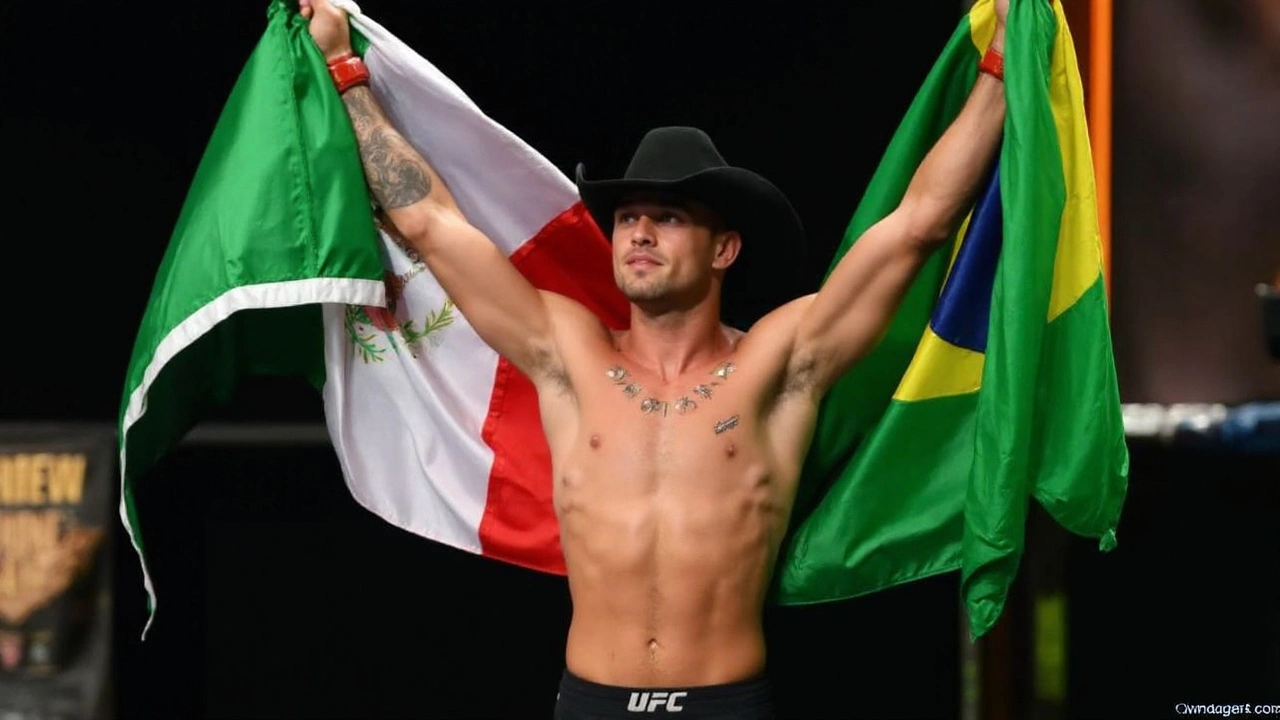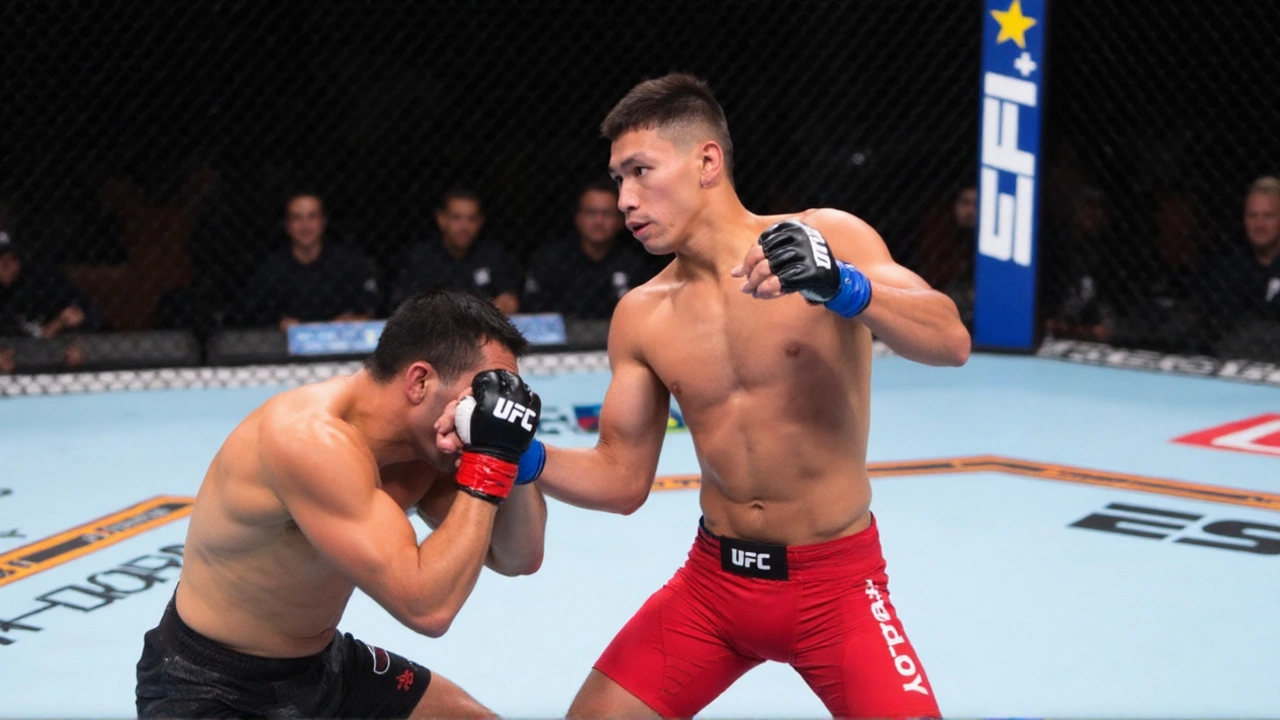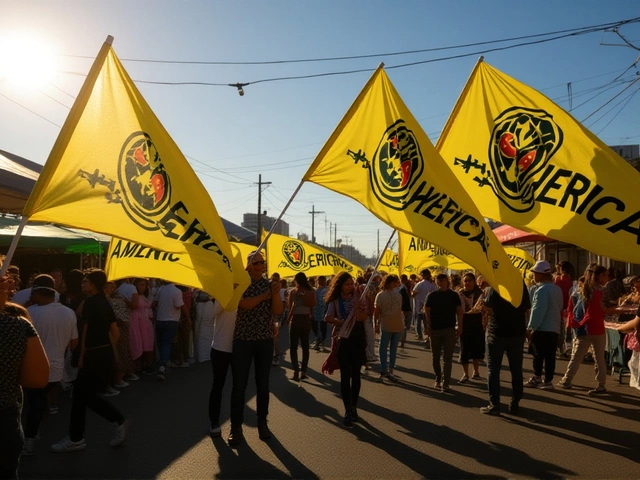Short-notice newcomer flips the script in San Antonio
A short-notice debut, a big underdog, and a ruthless finish—this was the night Alden Coria announced himself. The 27-year-old (debuting on the UFC stage) stopped Brazilian flyweight prospect Alessandro Costa via TKO at 0:47 of the third round at Noche UFC in San Antonio, with veteran referee Dan Miragliotta waving it off after a final barrage along the fence.
The upset hinged on patience and pressure. Through two rounds, the fight was tight and tense. Costa started sharper, fired first, and looked comfortable in the pocket. Coria stayed measured, refused to chase, and kept his reads. By late in the second, the tone shifted: Costa appeared to hurt his foot. He limped back to the corner, and that was all the invitation Coria needed to change gears.
Round three opened with urgency from the newcomer. Coria stepped forward behind simple, clean offense, cutting off space instead of following. He forced Costa to retreat, then trapped him near the fence. When Costa dipped for a desperate takedown, Coria was ready—he had talked about that exact scenario in fighter meetings. He stuffed the entry, created separation, and unloaded. A flurry landed clean, and Miragliotta stepped in before the damage piled up.
That finishing sequence wasn’t just power; it was planning. Coria’s team clearly prepped for late-fight scrambles, especially if Costa’s movement faded. Rather than get overexcited by the injury, he pressed without getting reckless—small steps, disciplined hands, no wild swings that could hand Costa a counter or an escape.
For a debuting athlete, that kind of composure stands out. Short-notice fighters often deal with incomplete camps, weight management on the fly, and limited time to tailor a strategy. Coria didn’t chase a home-run punch. He leaned into high-percentage pressure and forced Costa to make the first mistake. When it came—the reactive shot—Coria met it with balance and intent.
He delivered the moment on the mic, too. Speaking with Daniel Cormier, Coria called the win “amazing,” said he knew he belonged, and then aimed straight at the brass: “Hey Dana, I’m going to need that 50K. I’mma be a daddy in 8 months.” It was honest, emotional, and perfectly timed. Performance bonuses often reward decisive finishes and breakout moments. Whether he gets it or not, he made the ask in a way fans will remember.
Costa’s night was a tale of two phases. Early, he looked dialed: fast entries, confident counters, and solid reads in the exchanges. After the apparent foot issue, he struggled to slide off the fence or reset his stance in time. That forced him to stand his ground more often and reach for level changes that weren’t set up. The takedown attempt that triggered the finish felt like a necessity play—not a trap, not a layered attack, just a Hail Mary in a bad spot.
There’s no official word yet on the severity of Costa’s foot injury, and that matters for context. Fighters push through pain all the time, but footwork is flyweight currency. Take away clean pivots and lateral exits, and your options shrink. Credit to Costa for trying to fight through it. Credit to Coria for noticing the change and turning up the heat right then.
The flyweight division is unforgiving, and it loves fresh blood. Coria’s debut checks several boxes: resilience after a tough start, a clear adjustment mid-fight, and the confidence to close the show without wasting energy. The finish didn’t come from a wild, one-shot swing. It came from structure—pressure to the fence, a stuffed shot, and a clean burst of strikes. That is how you move from “short-notice newcomer” to “someone worth booking again soon.”
What should the matchmakers do next? A ranked opponent might be too quick, but a proven veteran on the edge of the Top 15 would test whether this composure holds across styles. Coria’s patience suggests he’ll welcome a longer camp and a proper scouting cycle. A quick turnaround would keep his momentum; a measured one would let him build on this foundation. Either path makes sense after a finish like that.
Moments like these remind you why late replacements are dangerous. They fight free. There’s less time to overthink, less time to stockpile film, and more room to surprise. Coria used that freedom well—he didn’t try to reinvent himself for one opponent. He relied on portable skills: balance on sprawls, tight combinations, and smart cage craft. Even his callout for $50,000 felt aligned with the performance: straightforward and decisive.
Beyond the winner’s surge, there’s a lesson in Costa’s effort. He had the cleaner start, and his reads were working. Injuries happen. The next step is recovery and reset. Costa has the tools to be competitive with anyone in that middle tier of flyweights: fast hands, good instincts, and experience in the grind. If the foot heals clean and he gets a camp to focus on re-centering his entries, he’s still a threat. The early minutes of this fight showed why many tabbed him as the favorite.
The crowd in San Antonio understood the swing. You could feel the tension when Costa limped to the stool, and the volume spiked the second Coria bit down at the start of the third. By the time Miragliotta stepped in, the building had gone full tilt. That’s the kind of turn that anchors a highlight reel—and the kind of debut that sticks in a matchmaker’s mind.
- Key adjustment: Coria pressed forward responsibly, cutting angles instead of chasing.
- Turning point: Costa’s visible foot issue late in round two limited his exits.
- Finishing trigger: A reactive takedown from Costa met by a prepared sprawl and flurry.
- Aftermath: A viral post-fight moment and a compelling case for a bonus.
Technically, the finish also showed Coria’s sense of tempo. He didn’t dump the gas tank on the first clean shot. He escalated in phases—close the distance, force the fence, make Costa choose, punish the choice. That’s energy management and ring IQ, not just athleticism.
If you’re tracking the wider flyweight picture, this result adds a new name to the watchlist. The division thrives on scramblers and pace pushers. Coria’s style, at least from one UFC outing, looks built for both. Take the result at face value—he beat a respected prospect, he did it with smarts, and he did it early in the third when the margin for error is small. That’s a strong signal.

Noche UFC gets its breakout moment
Noche UFC cards are built for energy, and this one got its spark. San Antonio turned into a proving ground for a debutant who wasn’t supposed to win. Coria’s night had all the pieces: adversity early, a visible shift in momentum, a clean finish, and a human hook—“I need that 50K; I’m about to be a dad.” It’s the sport distilled to its core: risk, timing, and a little bit of chaos.
There will be tape to study and details to polish. Coria will face opponents who don’t fade, who won’t give him a clean fence trap, who set up their shots behind feints and force longer defensive sequences on the mat. That’s the next test. But he walked into Noche UFC on short notice and walked out with a stoppage, and that’s the kind of debut that earns real opportunities.
As for Costa, the short-term goal is clarity on that foot and a plan to get back on schedule. Plenty of fighters have taken a hit, tuned up, and snapped back with strong performances. He has the foundation and the urgency to do the same once he’s healthy.
On a night made for momentum plays, Alden Coria created one—then cashed it in. For a division that rewards pace and precision, his debut made a simple point: he can keep both when it matters most.




Write a comment